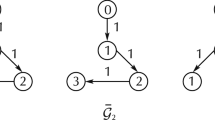Abstract
A significant challenge in designing consensus algorithms with output feedback is resolving unmeasurable states. Most available results require undirected graphs or linear multi-agent systems. Under a directed topology, this paper investigates the distributed output feedback consensus problem for second-order nonlinear multi-agent systems. Based on the high-gain observer, a novel consensus control algorithm that solely relies on the output information of each agent and its neighbors is proposed to ensure that all signals in the closed-loop system maintain bounded and practical output consensus can be achieved. The simulation results of the Josephson junction circuit are presented to illustrate the validity of the theoretical results.










Similar content being viewed by others
Data Availability
All data generated or analyzed during this study are included in this published article.
References
A. Abdessameud, A. Tayebi, Distributed consensus algorithms for a class of high-order multi-agent systems on directed graphs. IEEE Trans. on Autom. Control 63(10), 3464–3470 (2018)
C. Chen, K. Xie, F.L. Lewis, S. Xie, R. Fierro, Adaptive synchronization of multi-agent systems with resilience to communication link faults. Automatica 111, 108636 (2020)
C.-T. Chen, Linear System Theory and Design (Oxford University Press, New York, 1999)
D. Chowdhury, H.K. Khalil, Funnel control for nonlinear systems with arbitrary relative degree using high-gain observers. Automatica 105, 107–116 (2019)
L.O. Cua, Linear and Nonlinear Circuits (McGraw-Hill, New York, 1987)
I.S. Dimanidis, C.P. Bechlioulis, G.A. Rovithakis, Output feedback approximation-free prescribed performance tracking control for uncertain mimo nonlinear systems. IEEE Trans. Autom. Control 65(12), 5058–5069 (2020)
Z. Ding, Z. Li, Distributed adaptive consensus control of nonlinear output-feedback systems on directed graphs. Automatica 72, 46–52 (2016)
Y. Dong, J. Chen, J. Huang, Cooperative robust output regulation for second-order nonlinear multiagent systems with an unknown exosystem. IEEE Trans. Autom. Control 63(10), 3418–3425 (2018)
L.B. Freidovich, H.K. Khalil, Performance recovery of feedback-linearization-based designs. IEEE Trans. Autom. Control 53(10), 2324–2334 (2008)
C. Hua, S. Liu, X. Guan, Distributed adaptive output feedback leader-following consensus control for nonlinear multiagent systems. IEEE Trans. Syst. Man Cybern. Syst. 50(11), 4309–4317 (2018)
T. Jia, Y. Pan, H. Liang, H.-K. Lam, Event-based adaptive fixed-time fuzzy control for active vehicle suspension systems with time-varying displacement constraint. IEEE Trans. Fuzzy Syst., early access, (2021)
Y. Jiang, J. Liu, S. Wang, Consensus tracking algorithm via observer-based distributed output feedback for multi-agent systems under switching topology. Circuits Syst. Signal Process 33(10), 3037–3052 (2014)
H.K. Khalil, High-Gain Observers in Nonlinear Feedback Control (SIAM, Philadelphia, 2017)
S. Li, G. Battistelli, L. Chisci, W. Yi, B. Wang, L. Kong, Computationally efficient multi-agent multi-object tracking with labeled random finite sets. IEEE Trans. Signal Process 67(1), 260–275 (2018)
S. Li, Y. Pan, H. Liang, Output-constrained control of non-affine multi-agent systems with actuator faults and unknown dead zones. Circuits Syst. Signal Process 40(1), 114–135 (2021)
Y. Li, J. H. Park, L. Wu, Q. Kong, Distributed output-feedback adaptive fuzzy leader-following consensus of stochastic nonlinear interconnected multiagent systems. IEEE Trans. Syst. Man Cybern. Syst. (2020)
W. Liu, J. Huang, Cooperative global robust output regulation for nonlinear output feedback multiagent systems under directed switching networks. IEEE Trans. Autom. Control 62(12), 6339–6352 (2017)
F. Luo, Z.Y. Dong, G. Liang, J. Murata, Z. Xu, A distributed electricity trading system in active distribution networks based on multi-agent coalition and blockchain. IEEE Trans. Power Syst. 34(5), 4097–4108 (2019)
M. Meng, G. Xiao, B. Li, Adaptive consensus for heterogeneous multi-agent systems under sensor and actuator attacks. Automatica 122, 109242 (2020)
Y. Pan, Q. Li, H. Liang, H.-K. Lam, A novel mixed control approach for fuzzy systems via membership functions online learning policy. IEEE Trans. Fuzzy Syst. (2021)
W. Ren, R.W. Beard, Distributed Consensus in Multi-vehicle Cooperative Control (Springer, New York, 2008)
G. Wang, Distributed control of higher-order nonlinear multi-agent systems with unknown non-identical control directions under general directed graphs. Automatica 110, 108559 (2019)
G. Wang, C. Wang, Z. Ding, Y. Ji, Distributed consensus of nonlinear multi-agent systems with mismatched uncertainties and unknown high-frequency gains. IEEE Trans. Circuits Syst. II Exp. Briefs 68(3), 938–942 (2021)
Y. Yang, B. Ding, Tracking and formation of multi-agent systems with collision and obstacle avoidance based on distributed RHC. Circuits Syst. Signal Process 38(7), 2951–2970 (2019)
Acknowledgements
This work was supported in part by the Natural Science Foundation of China under Grant 62003214 and Grant 6217023627; in part by the National Defense Basic Research Program under Grant JCKY2019413D001; in part by the Shanghai Natural Science Foundation under Grant 22ZR1443600 and Grant 19ZR1436000; and in part by Shanghai Pujiang Program under Grant 2019PJD035.
Author information
Authors and Affiliations
Corresponding author
Ethics declarations
Conflict of interest
The authors declare that they have no conflicts of interest.
Additional information
Publisher's Note
Springer Nature remains neutral with regard to jurisdictional claims in published maps and institutional affiliations.
Rights and permissions
Springer Nature or its licensor holds exclusive rights to this article under a publishing agreement with the author(s) or other rightsholder(s); author self-archiving of the accepted manuscript version of this article is solely governed by the terms of such publishing agreement and applicable law.
About this article
Cite this article
Li, F., Wang, G., Hou, Y. et al. Output Feedback Consensus of Nonlinear Multi-agent Systems Under Directed Topologies. Circuits Syst Signal Process 42, 216–233 (2023). https://doi.org/10.1007/s00034-022-02137-w
Received:
Revised:
Accepted:
Published:
Issue Date:
DOI: https://doi.org/10.1007/s00034-022-02137-w



